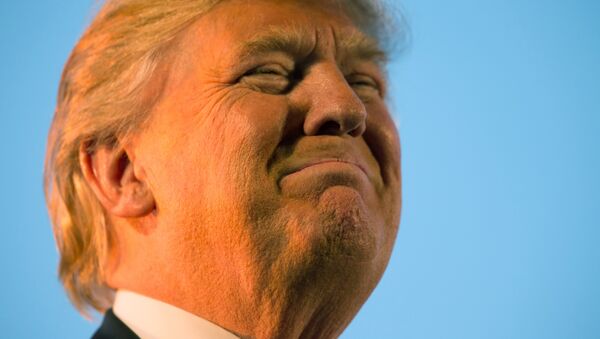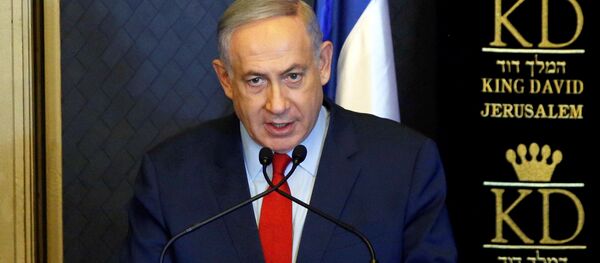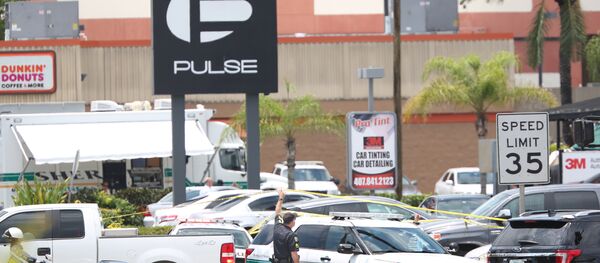On Monday, one day after the shooting attack at the Orlando Pulse Nightclub that left 49 people dead and 53 wounded, the worst shooting massacre in modern American history, Republican frontrunner Donald Trump on Monday reiterated his calls for a ban on Muslims entering the United States, "until we can figure out what the hell is going on," and urged gay voters to support him over Hillary Clinton because he will offer protection from intolerant Islamists.
The attempt to pit the two groups, who have long faced discrimination at the hands of far-right Republicans, against each other, struck the nation’s political punditry as both brilliant and macabre. At a time of national mourning many question whether a candidate who offers a rhetoric of division would ultimately benefit from a hate crime specifically targeting the LGBT community.
"The burden is on Hillary Clinton to tell us why we should admit anyone into our country who supports violence of any kind against gay and lesbian Americans," declared Trump. "Hillary Clinton can never claim to be a friend of the gay community as long as she continues to support immigration policies that bring Islamic extremists to our country who suppress women, gays and anyone who doesn’t share their views."
Many believe the attention-seeking billionaire – known for his inflammatory statements about women, Mexicans, Muslims, and the disabled – hit a nerve, as presumptive Democratic nominee Hillary Clinton quickly took a rhetorical u-turn, embracing Trump’s "radical Islam" phraseology, and shifting the discussion toward a militaristic clash of civilizations and theology.
Trump’s assault on the two often-ostracized communities also emboldened other far-right personalities, such as Pamela Gellar, who asked in a blog hours after the shooting, "Where are the left-wing, the gay and LGBT organizations denouncing the Islamic texts that inspire such mayhem and murder of gays? Where is that fierce gay leadership condemning Muslim oppression of gays under the sharia? The silence is deafening."
Leftwing activists continue to express hope for unity between LGBT and Muslim communities, with the expectation being that both groups will remember the oppression they have faced at the hands of ultra-right conservatives, often justified through fringe interpretations of Christianity.
On Monday, Loud & Clear’s Brian Becker sat down with Wilfredo Ruiz of the Council on American Islamic Relations (CAIR) and Sarah Sloan, of the anti-war ANSWER coalition, to talk about efforts by the Muslim and LGBT community to strengthen their bond in the midst of this tragedy.
Donald Trump looked to pit gays against Islam – Will it Work?
"What we see here operating is precisely the extremes," said Ruiz. "We see some people trying to attack now, with the Islamophobia discourse, and they are the same people who have gone after the LGBT community, so this is the intolerant element that we have been fighting for generations now."
Host Brian Becker noted that Clinton caved to Trump in adopting the "radical Islam" phraseology and claiming a divide of civilizations, wondering if this form of speech has played into the hands of the Republican’s hopes to divide the two often-discriminated against communities.
"In the days since the attack we have seen tens of thousands of people come out to pride marches, vigils, and marches to show solidarity with Orlando and the LGBT community," said Sloan, dismissing concerns. "They are taking a strong stand against homophobia and Islamophobia. There is a strong movement between both the LGBT community and the Muslim community to show solidarity to refuse to allow the politicians, government, and media to divide these two communities."
Sloan observed that Muslims and the LGBT community have faced political attacks and oppression at the hands of the same ultra-right forces, but expressed concern at how quickly political elites point to Islamic terrorism as the primary narrative.
"We see the political establishment on both side very opportunistically taking advantage of this situation and the religion of the attacker to further their warmongering and the foreign policy objectives, which are preexisting, and have nothing to do with what happened in Orlando, where they are trying to pin this on Islam," said Sloan.
"In reality, they have responsibility for bigotry against LGBT communities, which continues to be rampant in the United States, and they continue to play into that while refusing to take a stand against it, instead choosing to divert people’s attention to the further vilification of Islam, and of predominantly Muslim countries where the US seeks to wage war," she said.
Has the media turned terror into an ethnic or religious identity rather than an act?
"If you take the top ten mass shootings in America before this, none of them had been addressed as a terrorist attack," explained Ruiz. "Sandy Hook, when you see the children in the school being slaughtered, but there is a reluctance by the media to admit that there is domestic terrorism coming from the White Supremacists or radical acts by others."
"You see almost no discussion about the availability of guns and their role in massacres like this or whether there should be any gun control," he said. "They don’t do a story about gun control and ask why people can buy assault rifles in this country, supposedly for hunting."
"The element of this, being a hate crime as well, is being set aside, and it is just being taken as a terrorist attack, with questions about whether the guy was radicalized and inspired by ISIS," explained Ruiz. "It is an important discussion but a very incomplete discussion."






